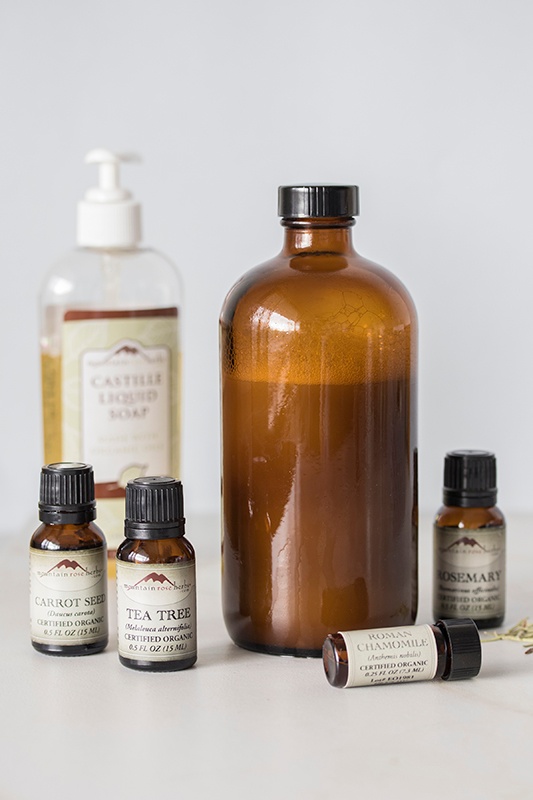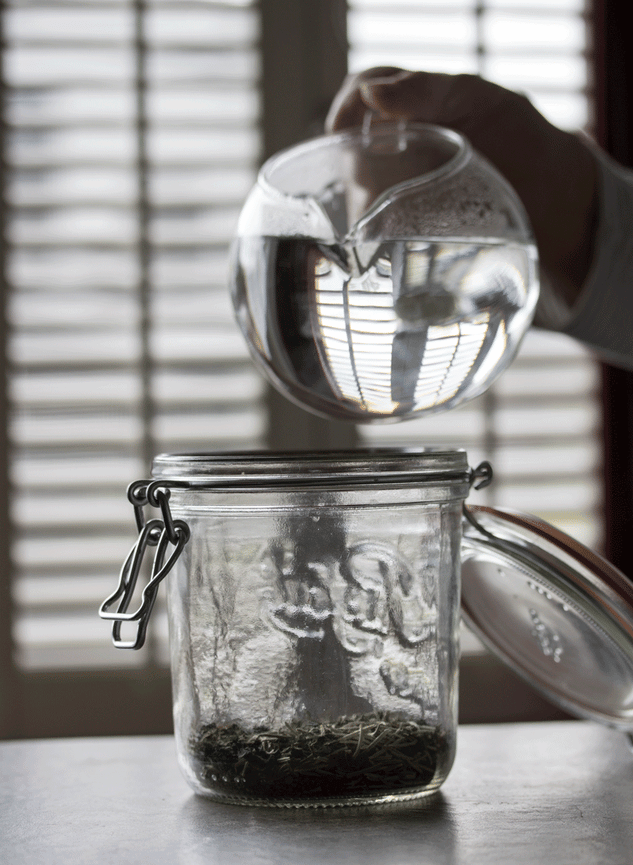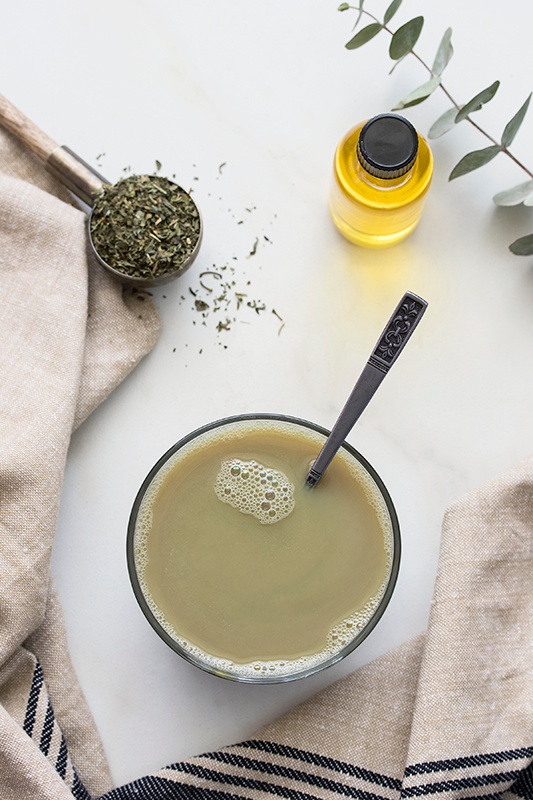
The majority of hair products commercially available, even among those touted as all-natural, contain synthetic detergents, fragrances, petrochemicals, and known allergens. These ingredients can be harsh for the scalp and hair. By making our own hair care products, we can help support the health of our hair and scalp – all while saving money!
Homemade hair care products are simple and inexpensive to create while also being gentle and nourishing for the scalp and hair. Not only can you harvest many of the ingredients from your garden, but you can customize the recipes so that they perfectly fit your specific needs.Herbal Shampoo
Homemade shampoo is not as thick or lathering as store-bought varieties, but it will effectively clean hair with nourishing ingredients and botanicals. Because this shampoo is so much gentler, you can expect that your hair will not feel as squeaky-clean after washing. This is because it will not be stripped of its natural oils!
Ingredients
8 oz water
3 oz Liquid Castille Soap
1-2 TBSP dried organic herbs of choice (see list below)
20-60 drops essential oil (see list below)
1/4 tsp organic Jojoba or Olive oil (adjust as needed – use more for dry hair or may omit for oily hair)
Directions
Make an herbal infusion by pouring boiling water over the herbs, cover, and allow them to steep for at least 4 hours. Strain the herbs out and pour the reserved liquid into a bottle, then add Castille soap and oils. Your herbal shampoo is now ready to use! Always shake well before use since the contents will naturally separate.
Oil Treatments
Oil treatments are a great way to naturally condition, cleanse, and invigorate the hair and scalp. Leaving hair soft, shiny, and silky, they are excellent for treating damaged, dry, dull, or frizzy hair and scalp conditions. A few drops of either of these recipes can also be used to tame those dry or wild-looking locks!To use, pour a little oil into your palm and massage it into scalp and hair. Add as much as needed, making sure to thoroughly coat your hair and scalp. Leave in for at least 30 minutes, the longer the better. I like to wrap my hair back into a bun and leave the oil in all day, washing it out at night. Once finished, be sure to shampoo the oil out completely. Don’t worry of your hair still feels a little oily after washing; it should absorb the residual oil as it dries.Heat deepens the oil’s penetration of the hair shaft, enhancing its benefits. Harness heat’s effects by sitting in the sunshine, by a wood stove, fireplace, or in a sauna. Or treat yourself to a hot oil treatment by gently warming the oil to 100 degrees Farenheit and massaging it into your hair and scalp. Pull your hair back, cover it with a shower cap or plastic bag, and finally wrap up with a thick wool cap to help retain heat. Leave head covered for at least an hour, then shampoo out.
Basic Hair Oil
To create, simply pour 1 oz organic Jojoba or Olive Oil into a bottle and add 10-30 drops essential oil of your choice (see list below). Shake before using to blend the oils.
Herbal Infused Hair Oil
Jojoba oil infused with botanicals has all of the benefits listed above, and then some! It will take a few weeks to infuse, but the resulting oil will be worth the wait! To make, place 8 oz organic Jojoba or Olive Oil and 3 or more TBSP dried organic herbs (see list below) in a glass jar, cap tightly, and infuse for 3-6 weeks. Shake the jar daily. Once infused, strain the herbs from the infused oil. The infused oil will last for at least a year if properly stored in a cool dark place. Soothing Lavender, Chamomile & Nettle Infused Vinegar Hair Rinse.

Hair Rinses
Hair rinses are simple to make, and they naturally condition the hair and scalp. They soften, add shine, body, and enhance natural highlights. To create an herbal hair rinse, simply pour 2 cups of boiling water over 3 or more TBSP of dried organic herbs (see list below) and allow to infuse for 8 hours or overnight. Strain herbs from the liquid, you can gently warm the liquid if you’d like. To use, slowly pour the rinse over your head, making sure to massage the infusion into your hair and scalp. Keep a large bowl under your head to catch the liquid and reapply. Repeat several times, and either rinse out or allow to dry.
Herbal Vinegar Rinse
Vinegar rinses have the same advantages as water-based hair rinses, and they also help restore hair’s pH balance. Vinegar is beneficial for oily hair, itchy scalp, dandruff, dull hair, and other scalp conditions. To make, place 3 or more TBSP dried organic herbs (see list below) and 8 oz organic Apple Cider Vinegar in a glass jar, cap tightly, and infuse for 3-6 weeks. Shake the jar daily. Once infused, strain the herbs out. To use, apply 1-2 TBSP herbal infused vinegar to damp hair and scalp and thoroughly massage in, then rinse out with water. Or, you can use the method described above by combining 1 TBSP herbal vinegar with 1 cup water, followed by a thorough rinse with plain water. The infused vinegar will keep for at least a year if stored properly in a cool and dry area.
Natural Hair Coloring
Did you know that you can use a plant to dye your hair? Henna naturally colors the hair; it’s made from the powdered leaves of the desert shrub plant Lawsonia. Henna comes in a variety of colors including black, mahogany, various shades of brown, red, burgundy, and marigold blonde. In addition to adding color, Henna will coat hair, seal in oils, and tighten the hair cuticle to give hair a rich and healthy shine. Henna’s effects will last up to 3 months. You can also use herbs to encourage natural highlights, see the list below for more information.
Herbs for Hair Care:
Normal hair: Basil, Calendula, Chamomile, Horsetail, Lavender, Linden flowers, Nettle, Parsley leaf, Rosemary, Sage, Watercress.Dry hair and scalp: Burdock root, Calendula, Chamomile, Comfrey leaf, Elder flowers, Horsetail, Lavender, Marshmallow root, Nettle, Parsley leaf, Sage.
Oily hair and scalp: Bay leaf, Burdock root, Calendula, Chamomile, Horsetail, Lemon Balm, Lavender, Lemon peel, Lemongrass, Nettle, Peppermint, Rosemary, Thyme, Witch Hazel bark, Yarrow leaf and flower.
Scalp conditions: Burdock root, Calendula, Chamomile, Comfrey leaf, Eucalyptus, Horsetail, Lavender, Marshmallow root, Nettle, Oregano, Peppermint, Rosemary, Sage, Thyme.
General health: Basil, Nettle, Rosemary, Sage.
Golden highlights: Calendula, Chamomile, Lemon, Sunflower petals.
Dark highlights: Black Tea, Black Walnut hulls (crushed or chopped), Comfrey root, Nettle, Rosemary, Sage.
Red highlights: Calendula, Henna, Hibiscus flowers, Red Clover flowers, Rose hips, Red Rose petals.
Interested in learning more about natural hair care? These books are full of information and recipes:Earthly Bodies Heavenly Hair by Dina FalconiOrganic Body Care Recipes by Stephanie Tourles~ irene










